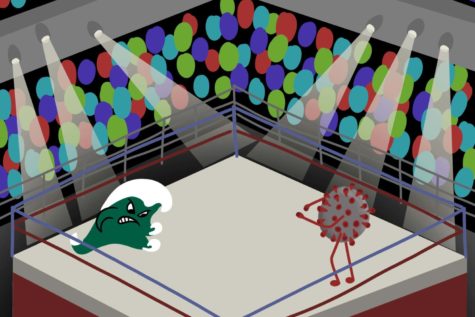OPINION | Tulane prepared for uncertain future of COVID-19
February 2, 2022

COVID-19 was declared a pandemic on March 11, 2020. Just three months later, U.S. COVID-19 cases reached two million, with no end in sight.
The global pandemic brought novel challenges. Uncertainty pervaded as shutdowns and stay-at-home orders swept through the nation. Without a vaccine, pausing life and sheltering in place seemed to be the only defense against the highly contagious and deadly virus.
In mid-March 2020, Tulane University was forced to shut down along with the rest of the world. Students and faculty had to leave campus and switch classes to Zoom for the remainder of the semester.
Zoom, a popular video-chatting app that allows for conferences, classes and even religious services to be held digitally, has become a well-known name in all classrooms.
While online schooling saved higher education during the beginning of the pandemic, it also comes with many limitations that hinder universities from providing the same quality of education as in-person classrooms.
For instance, teachers are not able to observe and connect with students the same way that one would in person. As a result, some students’ weaknesses go unnoticed.
Virtual learning proved to be unsustainable, and schools and students were desperate to get back to in-person classes.
In December 2021, colleges were once again reminded of the pain and insecurity that hit them just over a year-and-a-half earlier. The omicron COVID-19 variant ran rampant across the U.S., causing many schools to resort to the online platforms that they had implemented two years prior.
Tulane, like many schools across the nation, was forced to resort to a hybrid model of learning that allowed for students to decide whether they wanted to take classes online or in person for the remainder of the semester.
A statement released on Monday, Dec. 6 from university officials announced the first Tulane case of omicron. Just 10 days later and there were 176 new Tulane cases in a single day.
Just over two weeks after the initial email alerting the Tulane community about the first omicron case, university officials released another email with a slightly different tone and alarmingly reminiscent of March 2020.
In this email, university officials announced their plan to push the spring semester back a week, citing the surge in omicron cases as the reason for the delay. The week-long delay was implemented to allow for appropriate health precautions to be put in place and also gave students more time to get their vaccine boosters, which were made mandatory.
Local New Orleans organizations worked hard alongside universities to encourage students to get their booster vaccine. The Shot For $100 program rewarded students who got their booster vaccine with $100 Visa gift cards, a substantial reward for a small shot.
Now, two years into the pandemic and an estimated 65.1 million cases later, we have more knowledge and can better protect ourselves against whatever this pandemic throws our way.
According to the Centers of Disease Control and Prevention, receiving a booster dose of the COVID-19 vaccine helps to protect against severe illness from omicron.
The CDC also reported that the omicron variant is less severe than other variants that came before.
Tulane has a vaccination rate of 95%. Between the high vaccination rate and the relatively low severity of omicron, the Tulane community was at very low risk for severe COVID-19 outbreaks in the spring semester.
It is important to note that the COVID-19 protocols at Tulane do not only affect the student body. Tulane contracts a large number of Sodexo workers, a company that hires employees for food services and facility management. These workers are susceptible to any illness that the students bring with them on campus, as they are in close contact with the student body.
However, Tulane has a reinstated indoor mask mandate. When masks are properly worn, they serve as an effective barrier for reducing the transmission of COVID-19 droplets. All Tulane students, faculty and staff are required to wear masks in campus buildings, effectively reducing the transmission of COVID-19.
With virtual learning proving to be ineffective and high COVID-19 cases causing anxiety, it is understandable why Tulane decided to push the semester back.
However, with the overwhelmingly high vaccination rates on campus, the mildness of the omicron variant and the indoor mask mandate, Tulane’s decision to push back the start of the semester may have been hasty, bringing unnecessary trouble for students and their families.
COVID-19 does not appear to be going away. However, it is no longer March 2020. Tulane has the tools and resources to combat and control COVID-19 cases on campus. These tools and resources enable Tulane to continue providing its community with a campus life as close to normal as possible, even with the future of COVID-19 being so uncertain.






















Leave a Comment